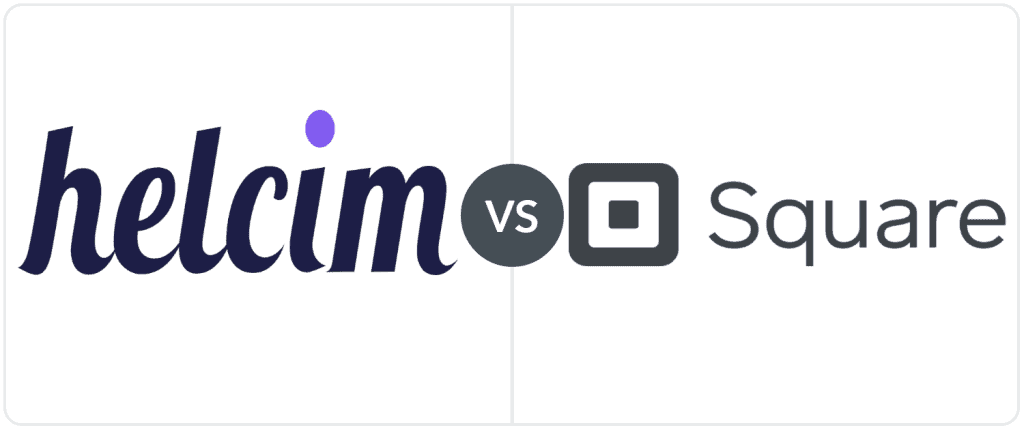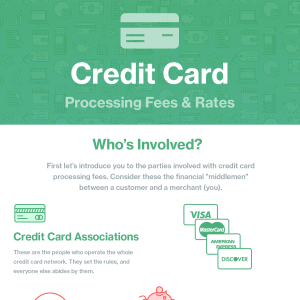Square and Helcim both offer powerful software, mobile credit card readers, and no monthly fees. Find out which one is right for you.
Our content reflects the editorial opinions of our experts. While our site makes money through
referral partnerships, we only partner with companies that meet our standards for quality, as outlined in our independent
rating and scoring system.

|
Helcim |
Square |
| Ideal For |
- Established businesses with medium to high processing volume
- Businesses needing a stable merchant account
- Seasonal businesses
|
- Newly-launched businesses
- Small or low-volume businesses
|
| Monthly Fee (Compare Pricing) |
$0/month |
$0-$165/month |
| Credit Card Reader Price |
- Helcim Card Reader ($99)
- Helcim Smart Terminal ($349)
|
- Square magstripe reader ($0)
- Square contactless + chip reader ($59)
- Square Terminal ($299)
|
| Standout Features |
- No monthly fees
- No long-term contracts or early termination fees
- Excellent customer support
|
- A rapid account approval process
- Predictable flat-rate pricing
- Variety of low-cost processing hardware options
|
| What’s Missing |
- High interchange-plus rates for low-volume businesses
- Processing hardware limited to one proprietary terminal
- Not available to high-risk merchants
|
- Limited customer support resources
- Flat-rate pricing is expensive at high volumes
- Monthly fees for optional services
|
| Next Steps |
Visit Site
Read Review
|
Visit Site
Read Review
|
Helcim VS Square At A Glance
Helcim and Square both rank among the top credit card processors for small businesses. Helcim offers some advantages over Square, such as better account stability with fully underwritten merchant accounts and more affordable interchange-plus pricing plans. Square, on the other hand, can be less expensive and easier to set up than Helcim for many small businesses.
The main thing that Helcim and Square have in common is that they’re among a small handful of payment processors on the market that tailor their services (and pricing) to meet the needs of small businesses. However, they both differ in how they meet those needs.
Where Helcim Wins
- Offers stable, full-service merchant accounts
- Month-to-month billing with no long-term contracts
- No monthly fees for a standard account
- Offers interchange-plus pricing exclusively
With no monthly account fee, Helcim is a legitimate alternative for seasonal and low-volume businesses that would otherwise flock to Square. The company’s lack of a long-term contract or additional monthly fees makes it very affordable for businesses that might otherwise feel that accepting credit cards would be too expensive.
With its proprietary credit card readers, payment gateway, and point-of-sale (POS) software, Helcim can easily serve as a one-stop shop for all of your business’s payment processing needs.
Where Helcim Falls Short
- Not available to high-risk merchants
- High interchange-plus rates at low processing volumes
Helcim keeps its costs low by excluding all high-risk merchants, so if you’re in a high-risk category for any reason, you’ll have to look elsewhere.
Helcim’s interchange-plus pricing can actually be more expensive than other options for very low-volume businesses or those that only occasionally have to accept a credit card payment.
Where Square Wins
- Expedited onboarding process
- Month-to-month billing with no long-term contracts
- Predictable flat-rate processing
- Affordable processing hardware
Square is a payment service provider (PSP), meaning you won’t have a fully-underwritten merchant account with a unique Merchant ID for your business. Instead, your account is aggregated with other Square users. This approach makes it much easier to sign up, but can also put you at a higher risk of a sudden account hold, freeze, or termination.
Flat-rate pricing and the lack of a monthly account fee make it easy to estimate your costs in advance. However, Square’s rates are significantly more expensive than what most merchants pay under interchange-plus pricing. Like Helcim, Square offers a complete processing ecosystem built upon proprietary products and services.
Where Square Falls Short
- Account stability issues
- Can be expensive at high processing volumes
- Some add-on services require monthly fees
Because the company doesn’t offer full-service merchant accounts that have been underwritten prior to approval, your Square account is more vulnerable to unexpected holds, freezes, and even terminations.
It’s also important to understand that flat-rate pricing, while very easy to understand, can actually be more expensive at higher processing volumes. We’d also note that while Square has built its reputation on low-cost services that don’t come with a monthly fee, many of the specialized features that the company has introduced in recent years do require a monthly subscription fee in addition to the cost of hardware and transaction processing.
Helcim VS Square: Pricing Comparison
|
Helcim |
Square |
| Monthly Fee |
$0/month |
$0-$165/month |
| Pricing Model |
Interchange-plus & cash discount |
Flat-rate |
| In-Person Transactions |
Interchange + 0.15-0.40% + $0.06-$0.08 |
2.5-2.6% + $0.10-$0.15 |
| Hardware Options |
- Helcim Card Reader
- Helcim Smart Terminal
|
- Square Reader for Magstripe
- Square Reader for Contactless + Chip
- Square Terminal
- Square Register
|
| Online Transactions |
Interchange + 0.15-0.50% + $0.15-$0.25 |
2.9% + $0.30 |
| ACH Payments |
- No monthly fee
- 0.5% + $0.25 ($6 cap for transactions <$25K)
|
- No monthly fee
- 1% (min. $1)
|
| Invoices |
$0.00/month |
- $0.00/month (free plan)
- $20.00/month (plus plan)
|
| PCI Compliance |
Free |
Free |
| Chargebacks |
$0-$15 (depending on outcome) |
Free |
Neither Helcim nor Square charges monthly fees for a basic account (although Square does charge monthly fees for certain optional add-on services and has several paid plans available), so the difference in your overall cost with each processor will mostly come down to transaction processing rates. You should also consider the cost of processing hardware if you need it.
While Square’s flat-rate pricing plan makes it relatively easy to estimate your costs in advance, Helcim’s exclusive use of interchange-plus pricing introduces an additional variable (i.e., the interchange rates themselves) that complicates estimating and comparing your costs with each processor.
Although Helcim’s interchange-plus rates for low-volume businesses are roughly comparable to what Square charges, the company also offers fully disclosed discounted rates to higher-volume businesses. On the other hand, Square only offers “custom pricing” (with no rates disclosed) to certain high-volume businesses.
Square’s pricing can be quite complex for businesses that need to access some of the company’s specialized services. For a more detailed breakdown of Square’s pricing structure, check out our article that discusses how much Square charges.
Helcim vs Square: Hardware Comparison
Helcim and Square both offer several proprietary devices for accepting credit and debit card payments. Which device is best for you will depend on the needs of your business and your budget. Here’s an overview of Helcim’s hardware options:
- Helcim Card Reader: The Helcim Card Reader is a very affordable and multifunctional device. For mobile payments, you can connect it to your smartphone or tablet via Bluetooth, allowing you to accept credit cards just about anywhere. It can also connect to a Windows or Mac desktop or laptop for use with the Helcim Point of Sale system. The Helcim Card Reader supports EMV, NFC, and PIN debit payment methods (but not magstripe) and includes a free countertop stand and charging cable.
- Helcim Smart Terminal: The Helcim Smart Terminal includes a color touchscreen, support for EMV, NFC, and PIN debit payment methods (again, magstripe is not supported), and a built-in thermal receipt printer. It comes with the Helcim POS software preinstalled and includes inventory management and customer database features. The Helcim Smart Terminal connects via Wi-Fi.
Square also offers a variety of card readers and terminals, each of which includes unique features. Here’s a very brief overview of your choices:
- Square Reader For Magstripe: Free with each account, supports magstripe payments only
- Square Reader For Contactless + Chip: Supports EMV and NFC payments, but not magstripe
- Square Terminal: Standalone terminal that supports magstripe, EMV, and NFC payments
- Square Handheld: Standalone mobile POS system that supports magstripe, EMV, and NFC payments
- Square Register: Standalone POS system with second customer-facing display
For more detailed information on Square’s line of processing hardware, please see our complete buyer’s guide to Square POS hardware.
Helcim vs Square: Features Comparison
|
Helcim |
Square |
| Point Of Sale |
- Helcim POS app
- Windows
- Mac
- iPhone
- iPad
- Android
- Included with an account
|
- Square POS app
- Square Register
- iPad
- Included with account
|
| Virtual Terminal |
- Helcim virtual terminal
- Included with an account
- No extra fee
|
- Square virtual terminal
- Included with an account
- No extra fee
|
| Card Vault |
Included with an account |
- Card on file
- Included with an account
|
| Inventory Management |
Included with an account |
Included with an account |
| Customer Database |
Included with an account |
Included with an account |
| Invoicing |
Included with an account |
Included with an account (free plan; plus plan available for $20 month) |
| eCommerce Store |
Included with an account |
Included with an account |
| Recurring Payments |
Included with an account |
Included with an account |
| Integrations |
QuickBooks, Great Exposure billing system, multiple shopping carts, etc. |
Square App Marketplace with many third-party integrations |
| Payment Links |
|
|
| QR Codes |
|
|
| SMS Payments |
|
|
| Social Media Selling |
|
|
| Cryptocurrency Processing |
|
|
Helcim and Square both offer nearly identical standard features with every account. These features include, among other things, an integrated payments platform for online and in-person sales, a virtual terminal for keyed-in payments, a simple online store, and support for a variety of alternative payment methods, such as ACH transfers, QR codes, and payment links. Square has a slight edge here, with support for selling on social media and accepting cryptocurrency payments.
Square’s basic account services can also be upgraded by adding optional services. Most of these extra services, however, require a monthly fee that will add to the overall cost of your account. Helcim, however, doesn’t offer any optional upgrades at this time. While this practice keeps your costs low, you won’t be able to upgrade to more sophisticated features as your business grows and your needs expand.
POS & Software
|
Helcim Point Of Sale |
Square Point Of Sale |
| Credit/Debit Card Processing |
|
|
| Virtual Terminal |
|
|
| Inventory Management |
|
|
| Customer Database |
|
|
| Employee Management |
|
- Essentials ($0/month)
- Advanced Access ($35/month/location)
|
| Business Analytics |
|
|
Virtual Terminal
Both Square and Helcim include a free virtual terminal as part of their point-of-sale software packages. Virtual terminals are primarily used to manually key in transactions when taking an order over the phone or through the mail, but can also be used with a compatible card reader for in-person transactions.
Helcim’s and Square’s virtual terminals offer similar features, including the ability to integrate with each company’s integrated payments platform and compatibility with their proprietary card readers.
Customer Database
Both companies offer a built-in customer database that allows you to store your customers’ card payment data, so they won’t have to re-enter it every time they make an online purchase.
Customer databases can also integrate with business analytics features for a more in-depth look at who your customers are and what they’re purchasing.
Inventory
Helcim and Square both offer an inventory management feature as part of their integrated payment platforms.
While Helcim’s inventory management is somewhat basic, Square offers more advanced capabilities through its Square for Retail specialty program. Although a free version is available, you’ll need to upgrade to the paid Pro Plan, which adds important features such as an inventory counting tool, inventory history, and smart stock forecasting.
For a more in-depth look at Square’s POS system, please see our full review of the Square POS app.
eCommerce
|
Helcim Online Store |
Square Online Store |
| Web Hosting & Domain Registration |
Free |
Free |
| Hosted Payment Pages |
|
|
| Third-Party Shopping Cart Integration |
|
|
| Customizable Checkout |
|
|
| PCI-Compliant Security Features |
|
|
Helcim and Square offer an online store that’s designed to be an out-of-the-box solution for any merchant looking to launch an eCommerce business. Both companies include web hosting and domain registration, saving you the expense of signing up with a third-party vendor (and paying a recurring fee).
However, if you want free domain registration, you’ll have to be content with a domain name that includes either Helcim or Square. Square offers custom domain registration that drops the ‘squareup’ from your URL, but you’ll have to sign up for a paid plan. These plans offer a tremendous number of additional features and customization options that you won’t get with the free plan. Helcim, on the other hand, doesn’t appear to offer custom domain registration or a paid eCommerce plan with additional features.
While Helcim’s and Square’s online stores feature a customizable, proprietary shopping cart, they can also integrate with popular third-party carts (e.g., BigCommerce, WooCommerce, etc.). If you already have a favorite shopping cart and want to ensure that it’s compatible with Helcim or Square, your best bet is to contact the company’s sales team for more information.
Helcim and Square also include several online security features to protect your customers’ payment data and help with PCI compliance, including tokenization and encryption. Note that as a payment service provider, Square handles all PCI compliance requirements for its shared merchant account; Helcim provides PCI compliance services (including quarterly security scans and assistance with the Self-Assessment Questionnaire) for your individual merchant account. Neither company charges a PCI compliance fee or a PCI non-compliance penalty.
Payment Acceptance
Helcim and Square both offer a variety of alternative payment methods in addition to standard credit and debit card processing. Both companies include support for the following payment methods at no additional cost:
- ACH Processing: Unlike many other providers, Helcim and Square include ACH processing as a standard feature of each account. While you won’t have to pay an additional monthly fee for this service, you will pay a modest per-transaction processing fee for each ACH transfer received.
- Payment Links & SMS Payments: Both companies also support using payment links as part of their online invoicing services. Links can be sent to customers for payment using either email or SMS messaging.
- QR Code Payments: Both companies support QR code payments. QR codes can be posted on your website or printed out and displayed in your retail store. While there’s no charge for this service, you’ll still have to pay the applicable payment processing fees, depending on how your customers choose to pay you.
Note that Square also supports social media selling and cryptocurrency payments, whereas Helcim currently does not support these payment methods.
Recurring Payments & Billing
With monthly or annual subscriptions being a popular way to pay for products or services these days, it’s important to have a recurring billing feature as part of your overall payment acceptance strategy. Both Helcim and Square offer very similar recurring billing services that include the following features:
- Included for free with each account
- Ability to store customer payment information in a card vault
- Ability to customize the frequency of recurring payments
- Automatically generate invoices for each recurring payment
- Automatically prompts the customer for updated card information when the card on file is about to expire
If your business relies heavily on recurring billing to maintain a positive cash flow, we recommend Helcim over Square for this feature. Square’s recurring billing feature is somewhat limited in customization options and closely tied to the Square Invoicing feature.
Helcim, on the other hand, offers many additional options, such as support for free trials, prorated billing, metered billing, and the ability to handle setup, registration, and other one-time fees that might be included in a customer’s subscription.
Invoices
|
Helcim |
Square |
| Unlimited Invoicing |
|
|
| Template & Logo Customization |
|
(Plus plan only] |
| Send Via Email Or SMS |
|
|
| Send Automatic Payment Reminders |
|
|
| Automatic Tax Calculations |
|
|
Helcim and Square both offer invoicing software with every account.
While both companies offer similar features and capabilities, Square’s free invoicing plan is quite basic and limited. You’ll need to sign up for the Square Invoicing Plus plan to unlock more powerful features, including customization options. This plan is only a good option for businesses that rely primarily on invoices to get paid by their customers.
Helcim’s free invoicing software includes more features (including automatic tax calculation), but can’t be upgraded if you need something more powerful.
Remember that while you can access invoicing software for free with either company, you’ll also have to pay all applicable credit and debit card processing fees when receiving customer payments.
Which Is Best For My Business?
As with many of our head-to-head matchups, neither Helcim nor Square emerges as a clear winner for all users. Which provider will be the better choice for your business depends on the nature and size of your business, as well as any specific services or features you’ll need. With either company, you’ll get a proprietary solution that offers all the basic services a business needs to run on a day-to-day basis.
Choose Square If…
- You’re just starting up and don’t have an established processing history
- You want to be able to predict your overall processing costs accurately
- You need more sophisticated processing hardware beyond a basic credit card reader
- You’re willing to pay extra for additional services, such as improved invoicing and eCommerce features
Choose Square
Choose Helcim If…
- You already have a stable credit card processing history
- You want to save money on processing through interchange-plus pricing
- You need the stability of a full-service merchant account
- You don’t need an expensive credit card terminal or dedicated POS system
Choose Helcim
Finally, neither Helcim nor Square accepts high-risk businesses (although Square makes an exception for CBD merchants). If you’re in a high-risk industry, check out our recommendations for the best high-risk merchant account providers that specialize in serving your industry.













